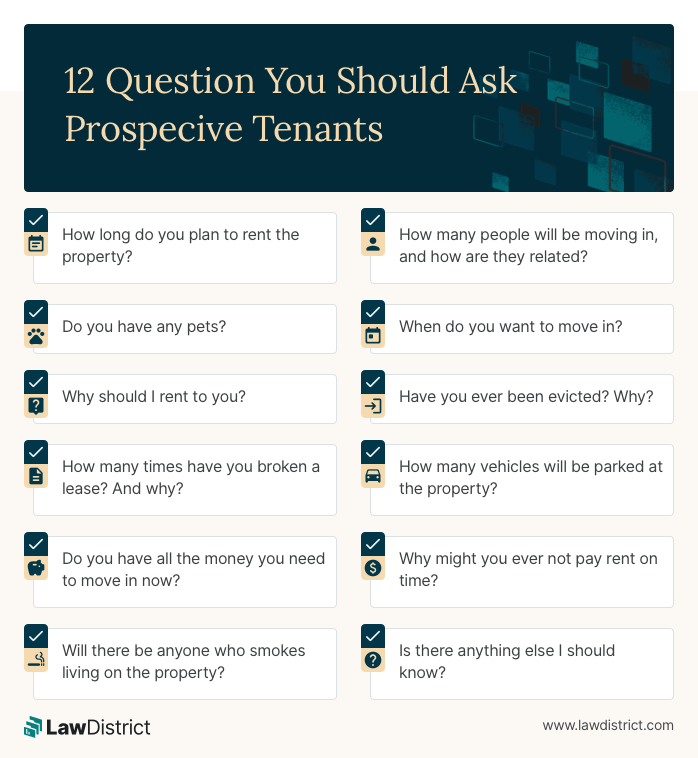As a landlord, the kind of tenants you rent to can greatly affect your day-to-day property management experience and your overall net return on investment. This is why it is extremely important to thoroughly screen prospective tenants and select only those who are a good fit for your rental property.
There are many prospective tenants you do not want to rent to. Perhaps they have a recent eviction, a large amount of past-due bills, a criminal background, they left their last apartment messy, are unemployed, or they don't earn enough money to pay their rent and other bills.
As a property owner, you can minimize all of these risks with proper tenant screening, using credit checks and criminal background checks, and by talking with their previous landlord and verifying their employment and income.
What Should Be in a Tenant Screening Checklist?
Here is a five-step tenant screening checklist that can solve most of a landlord’s problems before they even happen:
Prospective tenants will call or email you for more information and to schedule a viewing. This first contact is an excellent opportunity to pre-screen a prospective tenant.
If you are talking to a prospective tenant by phone, take notes during the conversation and ask questions. If, for example, they are interested in renting short-term, but you are looking for someone to rent long-term, identify this mismatch in order to save both of you some time.
The Viewing
Approach each viewing as is if you are interviewing the prospective tenant. Prepare notes based on the prospective tenant’s initial phone call. You may have many questions, and want to make sure that you get answers to all of them.
Some warning signs to look out for during the viewing include:
- Was the prospect late for the scheduled viewing?
- Were they nitpicking or looking for things to complain about?
- Did they attempt to use these complaints to persuade you to reduce the rent you asking for?
This kind of behavior might continue for the duration of your relationship with the person, and once they become a tenant of yours, this may manifest itself as paying the rent late and other troublesome behavior.
Follow Your Instincts
Being a landlord is not an exact science, and instincts will often suffice where there is a lack of experience. So, do not be afraid to follow your instincts when screening a tenant.
Remember, you are looking for someone with whom you will establish a long-term relationship and trust with your property. Be sure of your decision because an empty unit is often better than a bothersome tenant.
The Rental Application Form
Remember, leasing real estate is a business, and it is important for landlords to approach it as such. Landlords are strongly urged to use rental application forms, not only because they are valuable screening tools, but because they are great business tools as well.
Rental application forms are valuable because they:
- Outline what will be expected of both the landlord and prospective tenant
- Can be used by a landlord to assess the level of risk
- Assist in determining which prospective tenant will be best to rent to
Get Your Rental Application Here
Landlords can ask for specific information on a rental application form. Common information to request includes:
- Personal contact information
- Income and employment information
- Rental history
- Banking information
- Credit information
- Personal references
- Emergency contact information
Be sure to get the prospective tenant's written consent to perform your due diligence on them, including a credit check, criminal background check, and reference check.
What Questions Should I Ask Prospective Tenants?
Here is a list of tenant pre-screening questions that are designed to help you determine whether or not they qualify to lease your property before you arrange a viewing:

What Questions are Landlords Not Allowed to Ask?
In order for a landlord to protect themself from potential claims filed by a tenant regarding harassment and intimidation or discrimination, it is always best to avoid asking certain questions. Most importantly, a landlord should refrain from asking a prospective tenant any questions relating to a person's protected status under Title VIII of the Civil Rights Act of 1968.
Also known as the Fair Housing Act, this law makes it unlawful to:
Refuse to sell or rent after the making of a bona fide offer, or to refuse to negotiate for the sale or rental of, or otherwise make unavailable or deny, a dwelling to any person because of race, color, religion, sex, familial status, or national origin. (Sec. 804. [42 U.S.C. 3604])
This ensures that everyone has equal access to housing opportunities. And, among other things, means any questions relating to a person's protected status under the Fair Housing Act should be avoided.
While there are a few exemptions under federal law for all landlords, these exemptions do not apply in certain states that have their own fair housing laws. One exemption that is fairly consistent is when an individual landlord will be occupying the same premises as the tenant. Our rental application form generator takes each state into account when creating your document.
In conclusion, as a landlord, you should always conduct yourself in a professional manner, and operate your rental property as a fair housing opportunity for anyone who can satisfy your rental criteria.



